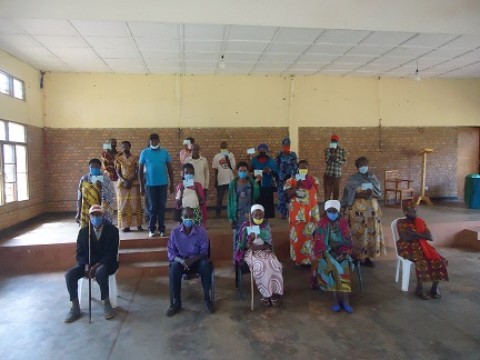In April 1994, Rwanda was immersed in a brutal wave of a thoroughly planned and state-monitored genocide perpetrated against the Tutsi. This genocide left more than one million people dead in only three months. In the Rukara sector, located in Kayonza District, Tutsi were massacred by the use of all means including guns, knives, and sticks to mention but a few. Besides, they destroyed the Tutsi’s property and committed other genocidal acts including murder and sexual violence. As a consequence, more than one million Tutsi were killed and a huge number of people ended up widowed and orphaned.
Economically, a great majority of the genocide survivors’ families, mostly widows, and orphan-headed households prove to be especially vulnerable, suffering from the effects of economic deprivation, which include a lack of food, housing, and money for the education and undertaking some lucrative initiatives. Orphans and genocide survivor windows require health insurance and food supply. In the same matter, of course, widows need empowerment to initiate income-generating activities.
Coronavirus pandemic worsened the situation of the Peace Education Initiative Rwanda(PeacEdu) beneficiaries as they are mentioned above. Therefore, PeacEdu endeavors to raise their socio-economic development, and solve some of its problems related to COVID-19 by providing them with hygienic and sanitation materials.
The 1994 Genocide against Tutsi left many genocide survivors with extreme poverty as a result of their property devastated by genocide perpetrators, exacerbated by chronic illnesses, helplessness, age hood, and incapacity to utilize their land, unskilled orphans, to name only a few. This results in lacking the capacity to fulfill their needs on their own whereby they do not afford health insurance, food, sanitation, and so on.
Again, vulnerable genocide survivor widows are not able to afford items needed to fulfill health measures to prevent the spread of COVID-19. Besides the sake of following measures, genocide survivors need to be protected too; they need to be a safe side to be sure that the COVID-19 pandemic attacks their lives.
The Peace Education Initiative aims for long-term changes. Genocide survivors are expected to culminate in the success of this initiative, live in a right-based and enabling society in which peace prevails where they witness improved health and safety and later, demonstrate tangible improvement in socio-economic living conditions.
On 12th July 2020, Peace Education Initiative Rwanda visited its beneficiaries in Rukara Sector. We had a friendly talk with our beneficiaries, helping them not to be overpowered by the past, but to stand firm in promoting peace and reconciliation and have strong hope in a better future.
Because we care much about lives, we provided Community Based Health Insurance popularly known as mutuelle de Santé for the year 2020-2021 for 21 households made of 100 individuals. It is much privileged for us to give vulnerable people access to healthcare services easily at an affordable price for the whole year. The beneficiaries, genocide survivor widows, were happy and promised to go to the hospital as soon as they fell sick. Especially because among those genocide survivors, some were raped, and live with HIV/AIDS, and others were disabled due to terrible fights they passed through during the genocide. So, they need constant and easy access to healthcare services.
It was proven that cleanliness and social distancing are the key measures to fight against the spread of COVID-19. So, To help our beneficiaries prevent the spread of COVID-19, we provided them with important sanitation materials. These include buckets and soaps. Each individual got one bucket and a bar of soap to use while washing hands.
Lastly, we made follow up on the impact of the domestic animals provided to our beneficiaries. To demonstrate the importance of livestock in the economic development and wellbeing of the rural households, especially in being a source of food supply, income, soil fertility, and sustaining agricultural production, we first handled goats to the vulnerable genocide survivor's households. Some of them gave birth, others are pregnant and others are just producing manure to fertilize farms. Now, our beneficiaries are witnessing the impact of provided goats on their economic growth.
During this activity of distribution of the sanitation materials and provision of health insurance, the Local government was presented by Nkunzurwanda John, the Executive Secretary of the Rukara Sector. He appreciated the role of Peace Education Initiative Rwanda as a partner, and its contribution to promoting peace, reconciliation, peacebuilding, and preventing genocide. Additionally, he appreciated PeacEdu’s role in uplifting the wellbeing and economic development of vulnerable genocide survivors. Besides that, he acknowledged the provision of health insurance as it is crucial to individuals in accessing health care.
Conclusion
Health insurance has a significant impact on improving the standards of living by enabling the largest segment of the population to gain access to health services at an affordable price which they would not access otherwise. As far as Peace Education Initiative Rwanda is concerned, we strive to mitigate the catastrophic out of pocket expenses on health care among vulnerable genocide survivor widows in Rukara Sector and motivate them to seek early treatment, consequently minimizing the use of traditional treatment and reducing severe health cases that might happen due to late treatment.


